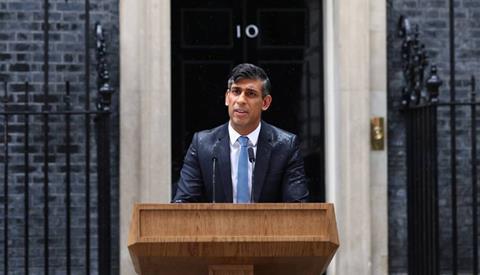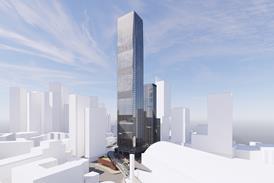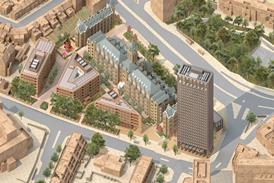Initial thoughts from industry leaders as the prime minister unexpectedly calls a 4 July election
Built environment leaders have been reacting to Rishi Sunak’s unexpected decision to call a general election for 4 July, with many hoping the poll will provide markets with much-needed certainty after a turbulent few years.
Will Poole, partner at architectural practice Howells, spoke to Building Design from the UKREIIF conference in Leeds. He said the “overall response” at the conference had been positive. “It kind of feels as though the market has been a little bit tentative, waiting for this to happen and to get some sort of definition around it. So I think it’s a positive thing.”
Poole said he expected the formation of a new government to see an upturn in the market. “It’s not a boom time at the moment, and I think that’s partly because there is a lot of uncertainty in the market. I think the interest rates the inflation have had an impact on that. And so I think we need a bit of certainty.”
Andy Cleevely, partner at consultant Ridge & Partners said Sunak’s election announcement just after 5pm yesterday had given conference attendees “a shot in the arm and seems to have created a bit of a buzz.”

“It seems to have been well received as good news that there’s going to be some clear outcome sooner rather than later,” he said, adding that there had been a “stasis” for the past years as overlapping constraints on building costs had made the market stagnate.
“Ultimately, it’s stability that will underpin confidence in the market and investment in the UK, and will also help the flow of new homes being built,” he said.
Asked if there was more warmth in the built environment towards Labour than the Conservatives, he said: “I think you’d have to be in quite an isolated mindset to feel that it was a balanced fight.I think that’s a question that probably answers itself.”
HLM Architects director Richard O’Neil was also at UKREIIF. He said the poll was an opportunity to ”re-establish confidence and trust in public office”.
”However the country decides, change must mean a commitment to invest in our communities, bring public and private investment together through clear collaborative initiatives,” he said.
”There are significant challenges that all parties need to address in their manifestos; homelessness, child poverty, climate change, social care and many other critical requirements. The construction industry needs to see clear leadership from the party manifestos.”
RIBA President Muyiwa Oki described the election as a pivotal moment for the UK and reiterated calls for an national retrofit strategy.
”We urgently need decisive action to deliver a built environment that meets people’s needs, both now and in the future. Policies that usher in the next generation of social housing and establish a national retrofit strategy must be at the heart of this election campaign and delivered by the next Government.
”The clock is ticking – the time to act is now. All political parties must set out bold and comprehensive plans to deliver a sustainable built environment, using architects’ expertise, that strengthen communities and enrich people’s lives.”
UKGBC deputy chief executive described the vote in six weeks’ time as the “built environment election”.
“With the linked environmental, nature and cost of living crises; this is the most important election in a generation,” he said.
“Our buildings are the nexus of how we can solve many of these pressing challenges while delivering homes, offices and public buildings that are warmer, more comfortable, cheaper to run, and which tread lighter on the planet.”
Director of operations for the Civil Engineering Contractors Association (CECA) Marie-Claude Hemming said it would allow the main parties to set out their plans for strengthening the UK economy, “sounding the starting gun on a new focus on the UK’s infrastructure needs”.
She said CECA wants to see the next government make “clear-cut commitments” to infrastructure policy within the first 100 days in office.
“Recent years have seen unprecedented shocks to the UK economy, such as the COVID-19 pandemic and the energy crisis prompted by Russia’s illegal invasion of Ukraine,” she added.
“That’s why it is more important than ever that we take the UK’s infrastructure needs out of party-political considerations, and work to ensure the requirements of businesses and communities will be met irrespective of the make-up of the next UK government.”
Many in the residential sector expressed hope the poll will provide much-needed certainty over the direction of housing policy.
Gavin Smart, chief executive of the Chartered Institute of Housing (CIH), said the election “provides an opportunity to place housing at the centre of the public discourse”.
Adam Lawrence, chief executive of housebuilder London Square, said we “need a new government now with a clear mandate to drive the UK forward.”
He said: “We have been in limbo for so long. We welcome clarity. It will be good for the housing sector and business generally.”
Jamie Ratcliff, chief communities and sustainability officer at newly-merged 80,000-home association Sovereign Network Group, said voters will expect “serious” manifesto pledges that treat housing as critical national infrastructure.
“Certainty of who will be governing the country will very welcome and whoever forms the next government must equally give certainty to the housing sector, supporting us to provide the good, affordable homes that are urgently needed,” Ratcliff added.
















No comments yet